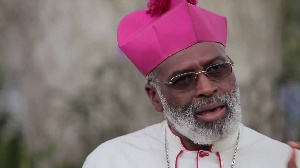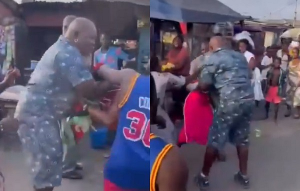The Catholic Standard, before it was banned by the PNDC government of Jerry John Rawlings in 1985, was Ghana’s oldest private newspaper, owned by the Catholic Church of Ghana.
The editor of the Catholic Standard during the PNDC era was Reverend Dr. Charles Palmer Buckle, the former ArchBishop of Accra.
It will be recalled that when the PNDC ousted Dr. Hilla Limann’s PNP government in 1981, the PNDC carried out several anti-democratic and human rights abuses against many Ghanaians including journalists, chiefs, traders, politicians, judges, university lecturers, ex-police and army officers, trade unionists, members of the clergy and ordinary citizens. For example apart from the murder of the three high court judges and an ex-army major in 1982, the regime also arrested and detained Kwesi Pratt and Kwaku Baako before being freed later on.
On 22 June, 1982, the publishers of the Free Press, Mr Tommy Thompson, his editor, Mr John Kugblenu, and Mike Adjei a senior writer of the paper, were all imprisoned without trial for penning editorials critical of the PNDC regime. After a year in detention the three were freed but John Kugblenu died a week after his release. In February 1985, the news-editor of the Pioneer newspaper together with Baffour Ankomah (the editor of Pioneer in Kumasi from 1983-6 and the New African magazine current editor) “were arrested and detained at Gondar Barracks in Accra accused of publishing ‘false reports’ about an assassination attempt on the life of Jerry Rawlings in Kumasi”. For their crime their heads were shaved. They were also tortured before being thrown into separate guardrooms. They were later released.
Fearing for their lives, several journalists, unionists, business people, politicians and army officers fled the country. For example the editors of Palaver and the Echo fled Ghana. John Dumoga, who edited The Echo, fled to Nigeria by means of a refuse truck. Baffour Ankomah later fled the country after his article ‘Ghana, Marxism and lies’ incurred the wrath of the PNDC apparatchiks.
In 1985 three union members of the Cocoa Marketing Board in Accra were arrested and sent to Gondar Barracks. One of them was tortured to death there. Another Ahmed Pobee, who was then 35 years, was seriously injured after a soldier violently stamped on his manhood. Pobee was freed but later escaped to Lagos in Nigeria after attempt were made to arrest him for the second time. Those journalists who stayed maintained a low profile, stopped writing anything political or branched into sports writing. These activities by the PNDC around the country, imposed what became known as the ‘culture of silence’ on the entire population.
However these atrocities did not go down well with the Catholic Standard and its editor Reverend Dr. Charles Palmer Buckle and many of the private press in the country including Free Press, The Palaver, The Echo, the Pioneer, The Believer, the Ghanaian Voice and many others. As a result the private press and particularly the Catholic Standard and Rev. Palmer Buckle became the mouthpiece of the silent majority. The Standard and its editor took it upon themselves to courageously fight for liberty and freedom for Ghanaians. For instance when John Kugblenu (editor of the Free Press) died in 1984, a week after his release from detention no paper was able to report it. It was Rev. Palmer Buckle and the Catholic Standard who mastered courage to report Kugblenu’s death.
Despite the threat to his life, Rev. Buckle did not budge. He actually developed a martyr’s complex, putting the interest of Ghanaians above his own life. He continued to highlight the brutalities of the regime while at the same time punching holes into the PNDC’s populist propaganda. As a result, Rev Buckle and the Catholic Standard became the target of the PNDC.
In fact the agents of the PNDC became incensed and were more ever determined to eliminate the vociferous reverend minister. As Baffour Ankomah observed in his article ‘Ghana’s culture of silence’: “In November 1985, the same Catholic Standard [and Palmer Buckle] antagonised the government with a series of down-to-earth editorials. The editor, Revd Dr Palmer Buckle, became a target, but when government soldiers moved in for the kill, they mistook another priest for Revd Buckle. The priest’s body was found at the Choker beach near Accra the following morning.”
The killing of the priest by regime’s forces was not the first time a man of God, had been killed by the PNDC. Three years before that tragedy, a similar tragedy had happened in Kumasi.
According to Ankomah, the PNDC declared “February 7, 1982 a national day of prayer — every Muslim, every Christian was to pray and ask for God’s blessings on Ghana, especially for rains and prosperity which we needed badly. It was a solemn day. But it so happened that a major in the armed forces stationed in Kumasi, entered a church building where national prayers were being said to ask the congregation to come out to assist in filling potholes on the road in front of the church. A misunderstanding ensued.
The major pulled a pistol. He was disarmed by a policewoman in the congregation who suffered a bullet wound in the face as a result. The gunshot so alarmed the congregation that they threw their Christianity out of the window and killed the major….When the news of his death reached the Kumasi Barracks, the Commander ordered his troops into town in pursuit of the fleeing murderers. A reign of terror was unleashed on the near one million residents of the city. For close up to a week, both the innocent and the guilty were arrested, several of them summarily executed, without trial.
The pastor of the church was captured three days later and shot. The soldiers sadistically tied his mutilated body to the back of one of their trucks, dragged it along the road from the Barracks to the centre of town (some two miles away), left it to public view for more than eight hours, and finally set fire to it before the eyes of the bemused and frightened inhabitants. Some of the soldiers even ran to the hospital where the policewoman had been admitted. They found her in bed, having just come through a major operation.
They shot her in the hospital bed, forcing all the other patients in the ward to flee for their lives. The soldiers then chased the surgeon who performed the operation around the hospital. Fortunately he was able to escape and flee the country. Later, the Commander of the troops came out publicly to say he had no regrets for the week’s incidents — the tyranny, the killing of innocents — and that if they had to do it again, they would.”
The PNDC became the NDC in 1992.
Lord Aikins Adusei is a graduate student at the School of Oriental and African Studies, University of London, Department of Development Studies.
Opinions of Saturday, 18 July 2020
Columnist: Lord Aikins Adusei



















